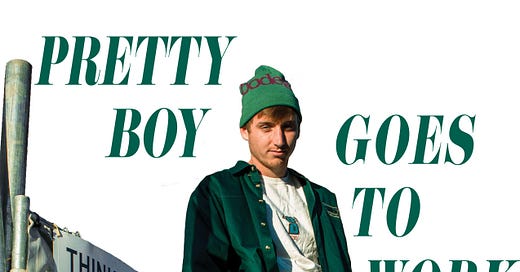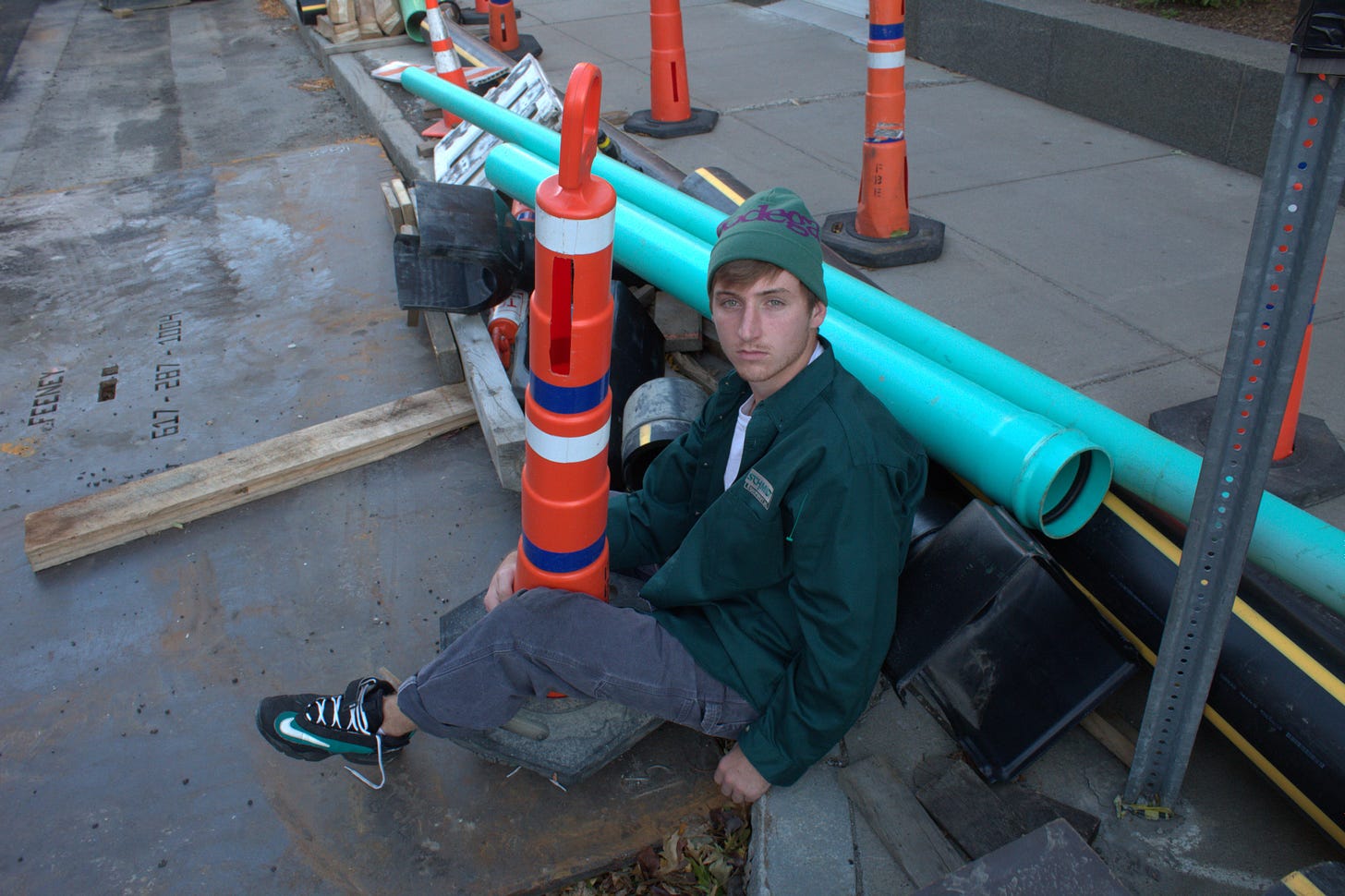pretty boy goes to work
thought I'd take the extra time I've got this month to republish some old shit; this is a piece I worked on in 2019 for Infinite Magazine, on workwear, authenticity, and the psychology of consumerism.
“Oh word up, you headed down to eggs? Or you just cruising today?” Replete in Carhartt WIP gear and fresh Jordan 1s he snagged from work at Concept’s Boston store, my skater homie’s ready to scour the city for his spot of the day. Even though he’s always up on the latest shit, he’s the most humble and eager-to-hang, and skating keeps his ear to the rhythms of the streets. Dickies, Carhartt, overalls and carpenter gear, he always had on the trappings of workmanship and long, tough days. Workwear and the idea of functional/utilitarian tough gear have come into the fashion zeitgeist, in tandem with looser silhouettes and 20-yr-old underground culture resurgences. While many trends surface due to designers’ visions, which trickle down through the hegemony of fashion into consumables, workwear’s turn in the spotlight seems to come out of a commodification of the spirit of labor.
We define ourselves by our work, and yet, the yute dem wish not to be identified by their own occupation or status in the pseudo-professional economy. Recollecting their grandparents’ appropriation of denim (most notably GAP and Levi’s, which were born as clothing outlets for the working man and easily upcycled themselves into multi-billion dollar symbols of suburban consumerism), we now turn to Carhartt, Dickie’s, and Stan Ray to cloak ourselves in the illusion of honest and hard work.
This false claim to a seat among the beleaguered may stem from the distinctly American construction of the rugged individual. Coal miners and factory workers are ubiquitous political references, and the American working class forms the backbone of our political economy. However, it is their exploitation and explicit lack of relation to power that emboldens their fetishization by the wealthy (old and new). Indeed, the aspiration to earnest labor almost begs the association of those projecting an image of honesty to an ethic of guilt.
It’s hard to tell what pathology lies behind the urge to claim another’s class, to dress oneself below status. Why not revel in your own stature, irrespective of its ill-gotten nature? Or cleanse your image through philanthropic acts, using benevolence to wipe away accusations of privilege and arrogance? Amidst current discussions of displacing and unmaking power structures and holding those with birthrights to said power accountable, it seems an association with these structures and privileges no longer befits their benefactors. Reinvention has supplanted these tactics. “Flexing” isn’t cool if you’ve already made it, it’s just dick-ish, unbecoming at best. So what gains cultural capital when opulence no longer holds the eye? When ostentatiousness lacks bombast? Commonplace, run-of-the-mill becomes retreated as the new “it”.
Indeed, the politics of our nation and of this trend pull heavily on each other; populism and appeals to “the heart of America” beget trends that run towards that pulse. And as more of us appeal to this identity and fake the funk, this phony idealization of our politics as anything other than milquetoast liberal rebrandings of capital entrenches itself further.
At what nexus does boring, near-pious clothing, as a reaction to the indulgence of years past, simply become boring again? Simplicity and stolidity become attractive when contrasted with periods of decadence and overflow, but once removed from this stoic context how visually compelling will this moment be? Are the rich hiding themselves out of a sense of embarrassment of power, or out of fear of retribution? As we more seriously address the exploitative nature of our economy, and the separation we feel from labor, when will the mask of sobriety and solemnity as construed through work apparel slip?
I just bought a Carhartt WIP beanie, and I’ve been fiending for the wallys they just put out: I’m applying this critique to myself as much as anyone else. But in light of the politics of this and other trends, how we construct our identities through clothing speaks to the ways we bend our truths, market ourselves, reveal our emptiness; the epitome of design is the consumerist drive to depict itself as its own goal, without questioning the consumption.
writing, directing, styling, casting by Alula Hunsen; photography by Macy McClure; modelling by (my guy) Peter Novoa






